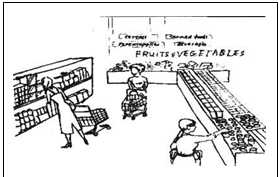
 天天向上一本好卷系列答案
天天向上一本好卷系列答案 小学生10分钟应用题系列答案
小学生10分钟应用题系列答案科目:高中英语 来源:不详 题型:完形填空
查看答案和解析>>
科目:高中英语 来源:不详 题型:完形填空
查看答案和解析>>
科目:高中英语 来源:不详 题型:阅读理解
 Kerstin Otto from Washington:
Kerstin Otto from Washington: The hotter it gets and the more layers of clothing disappear, the more tattoos and piercings appear on various places of the human body, I wouldn’t be caught dead with a snake tattooed on my ankle or with a piece of metal stuck in my belly button.
The hotter it gets and the more layers of clothing disappear, the more tattoos and piercings appear on various places of the human body, I wouldn’t be caught dead with a snake tattooed on my ankle or with a piece of metal stuck in my belly button. Tiara from Indiana:
Tiara from Indiana: I personally think body piercing is sickening. If there were supposed to be holes in your body, you would have been born with them. I do, however, think that ear piercing, is not wrong. There is a difference between ear piercing and belly button piercing. Ear piercing is not nearly as dangerous. I would be sick if someone stuck a needle in my belly button.
I personally think body piercing is sickening. If there were supposed to be holes in your body, you would have been born with them. I do, however, think that ear piercing, is not wrong. There is a difference between ear piercing and belly button piercing. Ear piercing is not nearly as dangerous. I would be sick if someone stuck a needle in my belly button. Lee from Illinois:
Lee from Illinois: Nagib from Washington:
Nagib from Washington: I wanted an earring. My friends had them and it looked like a cool thing. I wanted to get a nose ring, but my mum wouldn’t let me. Now I’m glad I didn’t get it. I just wanted a little stud, but I wouldn’t have looked good with it.
I wanted an earring. My friends had them and it looked like a cool thing. I wanted to get a nose ring, but my mum wouldn’t let me. Now I’m glad I didn’t get it. I just wanted a little stud, but I wouldn’t have looked good with it. Jackson from Ohio:
Jackson from Ohio: I don’t think it’s wrong, but when people do it all over the place like their face and everything —I think that’s ridiculous. People who get the big dragons that cover your whole body—I don’t think that’s necessary. When I see naked chicks on guys, I think. “You have no respect for women.”
I don’t think it’s wrong, but when people do it all over the place like their face and everything —I think that’s ridiculous. People who get the big dragons that cover your whole body—I don’t think that’s necessary. When I see naked chicks on guys, I think. “You have no respect for women.” Brittney from New York:
Brittney from New York: You don’t want to do stuff to your body. You don t need to do that because you were made perfect. You don’t need to add piercings. If it will make you feel beautiful and you really feel like you need to do it for yourself, then okay. If it really makes a big difference impacting your self-esteem and how you are towards others, then do it. But otherwise, don’t mess with what you got. Maybe you should try something more substantial(充实的)to find beauty in yourself.
You don’t want to do stuff to your body. You don t need to do that because you were made perfect. You don’t need to add piercings. If it will make you feel beautiful and you really feel like you need to do it for yourself, then okay. If it really makes a big difference impacting your self-esteem and how you are towards others, then do it. But otherwise, don’t mess with what you got. Maybe you should try something more substantial(充实的)to find beauty in yourself. A. Tiara B. Kerstin C. Nagib. D. Lee.
A. Tiara B. Kerstin C. Nagib. D. Lee.查看答案和解析>>
科目:高中英语 来源:不详 题型:完形填空
查看答案和解析>>
科目:高中英语 来源:不详 题型:阅读理解
查看答案和解析>>
科目:高中英语 来源:不详 题型:阅读理解
查看答案和解析>>
科目:高中英语 来源:不详 题型:阅读理解
查看答案和解析>>
科目:高中英语 来源:不详 题型:阅读理解

 You push a shopping cart and put your food in it.
You push a shopping cart and put your food in it.查看答案和解析>>
湖北省互联网违法和不良信息举报平台 | 网上有害信息举报专区 | 电信诈骗举报专区 | 涉历史虚无主义有害信息举报专区 | 涉企侵权举报专区
违法和不良信息举报电话:027-86699610 举报邮箱:58377363@163.com